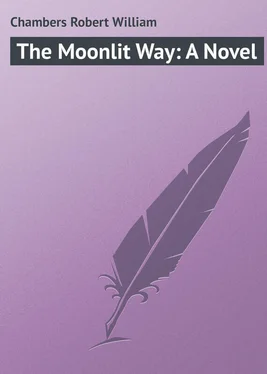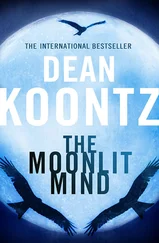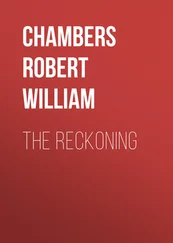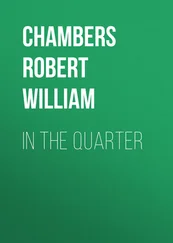Robert Chambers - The Moonlit Way - A Novel
Здесь есть возможность читать онлайн «Robert Chambers - The Moonlit Way - A Novel» — ознакомительный отрывок электронной книги совершенно бесплатно, а после прочтения отрывка купить полную версию. В некоторых случаях можно слушать аудио, скачать через торрент в формате fb2 и присутствует краткое содержание. Жанр: foreign_prose, на английском языке. Описание произведения, (предисловие) а так же отзывы посетителей доступны на портале библиотеки ЛибКат.
- Название:The Moonlit Way: A Novel
- Автор:
- Жанр:
- Год:неизвестен
- ISBN:нет данных
- Рейтинг книги:5 / 5. Голосов: 1
-
Избранное:Добавить в избранное
- Отзывы:
-
Ваша оценка:
- 100
- 1
- 2
- 3
- 4
- 5
The Moonlit Way: A Novel: краткое содержание, описание и аннотация
Предлагаем к чтению аннотацию, описание, краткое содержание или предисловие (зависит от того, что написал сам автор книги «The Moonlit Way: A Novel»). Если вы не нашли необходимую информацию о книге — напишите в комментариях, мы постараемся отыскать её.
The Moonlit Way: A Novel — читать онлайн ознакомительный отрывок
Ниже представлен текст книги, разбитый по страницам. Система сохранения места последней прочитанной страницы, позволяет с удобством читать онлайн бесплатно книгу «The Moonlit Way: A Novel», без необходимости каждый раз заново искать на чём Вы остановились. Поставьте закладку, и сможете в любой момент перейти на страницу, на которой закончили чтение.
Интервал:
Закладка:
Still a trifle startled, she laid aside the receiver with a disturbed glance toward the wrought-iron door at the further end of the hall.
She had no desire at all to call up her father at Grogan’s and inform him of what had occurred. The mere thought of surreptitious listening in, of eavesdropping, of informing, reddened her face. Also, she had long since lost confidence in the somewhat battered but jaunty man who had always neglected her, although never otherwise unkind, even when intoxicated.
No, she would neither listen in nor inform on anybody at the behest of a father for whom, alas, she had no respect, merely those shreds of conventional feeling 83 which might once have been filial affection, but had become merely an habitual solicitude.
No, her character, her nature refused such obedience. If there was trouble between the owner of the unusually sweet voice and Mr. Barres, it was their affair, not hers, not her father’s.
This settled in her mind, she opened another book and turned the pages slowly until she came to the lesson to be learned.
It was hard to concentrate; her thoughts were straying, now, to Barres.
And, as she leaned there, musing above her dingy school book, through the grilled door at the further end of the hall stepped a young girl in a light summer gown – a beautiful girl, lithe, graceful, exquisitely groomed – who came swiftly up to the desk, a trifle pale and breathless:
“Mr. Barres? He lives here?”
“Yes.”
“Please announce Miss Dunois.”
Dulcie flushed deeply under the shock:
“Mr. – Mr. Barres is still out – ”
“Oh. Was it you I talked to over the telephone?” asked Thessalie Dunois.
“Yes.”
“Mr. Barres has not returned?”
“No.”
Thessalie bit her lip, hesitated, turned to go. And at the same instant Dulcie saw the one-eyed man at the street door, peering through the iron grille.
Thessalie saw him, too, stiffened to marble, stood staring straight at him.
He turned and went away up the street. But Dulcie, to whom the incident signified nothing in particular except the impudence of a one-eyed man, was not prepared 84 for the face which Thessalie Dunois turned toward her. Not a vestige of colour remained in it, and her dark eyes seemed feverish and too large.
“You need not give Mr. Barres any message from me,” she said in an altered voice, which sounded strained and unsteady. “Please do not even say that I came or mention my name… May I ask it of you?”
Dulcie, very silent in her surprise, made no reply.
“Please may I ask it of you?” whispered Thessalie. “Do you mind not telling anybody that I was here?”
“If – you wish it.”
“I do. May I trust you?”
“Y-yes.”
“Thank you – ” A bank bill was in her gloved fingers; intuition warned her; she took another swift look at Dulcie. The child’s face was flaming scarlet.
“Forgive me,” whispered Thessalie… “And thank you, dear – ” She bent over quickly, took Dulcie’s hand, pressed it, looking her in the eyes.
“It’s all right,” she whispered. “I am not asking you to do anything you shouldn’t. Mr. Barres will understand it all when I write to him… Did you see that man at the street door, looking through the grating?”
“Yes.”
“Do you know who he is?” whispered Thessalie.
“No.”
“Have you never before seen him?”
“Yes. He was here at two o’clock talking to my father.”
“Your father?”
“My father’s name is Lawrence Soane. He is superintendent of Dragon Court.”
“What is your name?”
“Dulcie Soane.”
Thessalie still held her hand tightly. Then with a quick but forced smile, she pressed it, thanking the girl for her consideration, turned and walked swiftly through the hall out into the street.
Dulcie, dreaming over her closed books in the fading light, vaguely uneasy lest her silence might embrace the faintest shadow of disloyalty to Barres, looked up quickly at the sound of his familiar footsteps on the pavement.
“Hello, little comrade,” he called to her on his way to the stairs. “Didn’t we have a jolly party the other evening? I’m going out to another party this evening, but I bet it won’t be as jolly as ours!”
The girl smiled happily.
“Any letters, Sweetness?”
“None, Mr. Barres.”
“All the better. I have too many letters, too many visitors. It leaves me no time to have another party with you. But we shall have another, Dulcie – never fear. That is,” he added, pretending to doubt her receptiveness of his invitation, “if you would care to have another with me.”
She merely looked at him, smiling deliciously.
“Be a good child and we’ll have another!” he called back to her, running on up the western staircase.
Around seven o’clock her father came in, steady enough of foot but shiny-red in the face and maudlin drunk.
“That woman was here,” he whined, “an’ ye never called me up! I am b-bethrayed be me childer – wurra the day – ”
“Please, father! If any one sees you – ”
“An’ phwy not! Am I ashamed o’ the tears I shed? 86 No, I am not. No Irishman need take shame along av the tears he sheds for Ireland – God bless her where she shtands! – wid the hob-nails av the crool tyrant foreninst her bleeding neck an’ – ”
“Father, please – ”
“That woman I warned ye of! She was here! ’Twas the wan-eyed lad who seen her – ”
Dulcie rose and took him by his arm. He made no resistance; but he wept while she conducted him bedward, as the immemorial wrongs of Ireland tore his soul.
VII
OPPORTUNITY KNOCKS
The tremendous tragedy in Europe, now nearing the end of the second act, had been slowly shaking the drowsy Western World out of its snug slumber of complacency. Young America was already sitting up in bed, awake, alert, listening. Older America, more difficult to convince, rolled solemn and interrogative eyes toward Washington, where the wooden gods still sat nodding in a row, smiling vacuously at destiny out of carved and painted features. Eyes had they but they saw not, ears but they heard not; neither spake they through their mouths.
Yet, they that made them were no longer like unto them, for many an anxious idolater no longer trusted in them. For their old God’s voice was sounding in their ears.
The voice of a great ex-president, too, had been thundering from the wilderness; lesser prophets, endowed, however, with intellect and vision, had been warning the young West that the second advent of Attila was at hand; an officer of the army, inspired of God, had preached preparedness from the market places and had established for its few disciples an habitation; and a great Admiral had died of a broken heart because his lips had been officially sealed – the wisest lips that ever told of those who go down to the sea in ships.
Plainer and plainer in American ears sounded the 88 mounting surf of that blood-red sea thundering against the frontiers of Democracy; clearer and clearer came the discordant clamour of the barbaric hordes; louder and more menacing the half-crazed blasphemies of their chief, who had given the very name of the Scourge of God to one among the degenerate litter he had sired.
Garret Barres had been educated like any American of modern New York type. Harvard, then five years abroad, and a return to his native city revealed him as an ambitious, receptive, intelligent young man, deeply interested in himself and his own affairs, theoretically patriotic, a good citizen by intention, an affectionate son and brother, and already a pretty good painter of the saner species.
A modest income of his own enabled him to bide his time and decline pot-boilers. A comparatively young father and an even more youthful mother, both of sporting proclivities, together with a sister of the same tastes, were his preferred companions when he had time to go home to the family rooftree in northern New York. His lines, indeed, were cast in pleasant places. Beside still waters in green pastures, he could always restore his city-tarnished soul when he desired to retire for a while from the battleground of endeavour.
Читать дальшеИнтервал:
Закладка:
Похожие книги на «The Moonlit Way: A Novel»
Представляем Вашему вниманию похожие книги на «The Moonlit Way: A Novel» списком для выбора. Мы отобрали схожую по названию и смыслу литературу в надежде предоставить читателям больше вариантов отыскать новые, интересные, ещё непрочитанные произведения.
Обсуждение, отзывы о книге «The Moonlit Way: A Novel» и просто собственные мнения читателей. Оставьте ваши комментарии, напишите, что Вы думаете о произведении, его смысле или главных героях. Укажите что конкретно понравилось, а что нет, и почему Вы так считаете.












